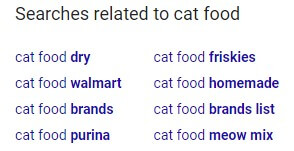
I often get asked by clients how I can improve the SEO (search engine optimization) without keyword stuffing their content. Like most companies, they want to create compelling content. But they get stuck with keywords that are hard to rank for. Then the content ends up reading awkwardly because keywords have been dropped in randomly and end up disrupting the flow of the writing. This frustration is partially why Google started to use LSI keywords. They did this in order to help writers write naturally, and to help searchers easily find their content.
What Is LSI?
LSI stands for Latent Semantic Indexing. These LSI keywords are keywords that are semantically (semantic is defined as the meaning or interpretation of a word or sentence) related to the main keyword you’re focusing on. That’s not to say these words are synonyms, but instead they are related to each other, or are commonly used together. For example, let’s say your primary focus keyword is jelly – what do you instinctively think of next? For most people it’s peanut butter. Peanut butter and jelly go together, but they’re not synonyms. This would be just one example of what LSI keywords are.
How Do LSI Keywords Work
Let’s say you are writing a blog about cats. You could be writing about any of these topics:
- Cats the musical
- CAT as in a cost analysis tool
- Cats the perfect, cute, and furry animals
- Caterpillar, the agricultural equipment manufacturer
There are plenty of things you could be writing about when you use the word ‘cats’ in your article, so how do the search engines know what to show the searcher when they search for cats? What Google does is looks for LSI keywords in your blog post to decide which cats you’re talking about. If your blog is about the perfect little animals cats, Google will be looking for words like ‘cute,’ ‘petting,’ ‘animal,’ ‘biting,’ and similar words in order to understand that your blog post is about the animal cats. Let’s say someone is searching for something like, ‘why isn’t my cat eating’ Google will know that the searcher is looking for information about an animal, specifically about the eating habits of an animal, and if your blog is optimized for ‘cats’ and ‘eating’ then Google will be more likely to show your blog.
What Is The Importance Of LSI Keywords
LSI keywords became important because Google now looks for overall content, more so than looking for specific keywords, in order to give users a better experience. A lot of content writers got carried away with only writing for certain keywords that they ended up no longer writing for humans to read, rather they were writing for Google to read. When you write for search engines, it removes the end-user experience from the equation, and that isn’t what Google wants. Of course you want your content to rank for the desired purpose. But you have to do it in a way that it is useful to your audience. Ultimately Google’s goal is to have searchers on their website for the least amount of time as possible. They do this by giving users the content they are looking for the first time they search. That’s why LSI keywords are important. It’s also one of the many reasons why Google now looks at the entire content on your page, rather than just focusing on one keyword.
How Can I Better Use LSI Keywords When I Write
While there are many tools out there to find your perfect LSI keywords in order to use them in your writing, I have pulled two of the resources I commonly use. Typically, LSI keywords come through writing naturally, so LSI keywords are going to occur naturally if you naturally write like a human. Of course, here are a couple tools to try out if you’re looking to try to include more LSI keywords:
Google Search: Do a quick Google search for your focus keyword. Go to the bottom of the search result and look at the “Searches related to XYZ”. For example, I searched “cat food” and here are some LSIs from Google:

These are words that I can look at putting into my blog post if I want to show up in relevant search results more often.
LSI Graph: To use this tool, just put your keywords in, and it will spit back out a list of LSI words they recommend using.
No matter how you go about finding your LSI keywords, I highly encourage you to include them in your keyword research before you start writing. Do this in order to have the best chances of ranking highly. Have any questions about LSI keywords? Ask in the comments below! Need help with your SEO? Contact me today and I’d love to help you!


1 comment on “LSI Keywords: What Are They and Why Should You Care?”